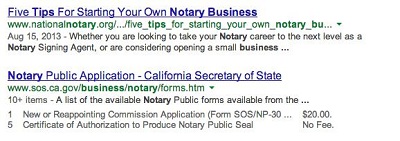Most Notary Entrepreneurs are serious about their businesses. They have websites, social profiles, they’re listed in online directories, and more. But how many of those are optimized for Internet searching?
That’s where SEO — or search engine optimization — comes into play.
SEO may not be A-B-C to most people, but having a basic understanding will help get more leads for your business. SEO is the art of making your business more visible in search results.
This is the first of a three-part series designed to help you get the most out of your online presence and to see direct results in more signings and qualified leads for your Notary business. It tackles basic technical aspects of SEO, the importance of building a local and social footprint, and how to produce great content and get links. For anything that requires an additional explanation, simply searching “how to XYZ” should help you find resources with step-by-step processes.
Set up a website
The adage goes, “if you’re not online you don’t exist.” Maybe it’s not actually true, but it is perceptually. When so many people go to Google as their first (and last) resort in finding something, if you’re not there – they won’t find you.
So if you don’t have a website already, this should be your number one investment.
Even if you don’t have a large (or any) marketing budget, that doesn’t mean you can’t start a website. A good web design company can build a website for a few thousand dollars, but you can also contact a local university and see if any of the computer science or business professors know students with experience in web development. You can get a pretty decent website for a much lower price tag. If you’re not tech savvy, but want to build it yourself, there are really easy templates you can set up on Wix or Weebly. But don’t stop there.
 Be mobile-friendly
Be mobile-friendly
The statistics on mobile versus desktop Internet usage are amazing. While 8% of all web traffic in the U.S. is mobile traffic, one half of all local searches are performed on mobile devices. Since signing agents are local business owners, you can be sure that some traffic to your site is going to be via a smart phone. Consider whether your website is easy to navigate for mobile users, or whether it will take too long to load on their device. A lot of mobile searches draw from Yelp, so if you’re not listed on that website, you might be missing out (see part two of this series for more on local search). A lot of “build your own website” providers will offer “responsive design” options as part of your package. Make sure you look for this option as it will ensure that your website is mobile-friendly.
Use keywords
This comes with a caveat, because you don’t want to use too many keywords or your website will look “spammy”. You want to use keywords primarily in the web page address (called the URL), in the page description, title, headers and text. However, it is more important that your page is user-friendly and readable, so if your keywords are interfering with user experience, you need to reword your content or forgo using those keywords.
Make sure that your location and services are clear. If you have a services page, take the opportunity to list the different industries you serve: real estate, mortgage signing, loan signing, power-of-attorney signing, etc. Consider what your clients are actuallysearching for, and see if there is a natural way to include that. You can take advantage of a lot more keywords by having a blog (see part three of this series).

Have user-friendly page descriptions and titles
Even basic website templates give you the option to fill in page descriptions and titles. This allows you to name your page appropriately and fill in an accurate description of the page.

This is my top result for “notary business tips” in Google. The page title is “Five Tips for Starting Your Own Notary Business” – intriguing, right? The description is below the title, clearly using relevant keywords and an accurate description. You can see that the results have clean URLs (it tells you exactly what you’re looking at – not a combination of letters and numbers) as well – which many times you can set up in a website editor. Be careful that you aren’t changing the URLs after they’re done – this will cause any links to that page to be broken. This results in frustrated users and lost links.
Be sure to check out parts two and three of this series on basic SEO for advanced signing agents to delve into topics on branding, local listings and social media.

